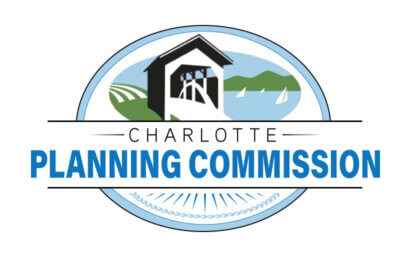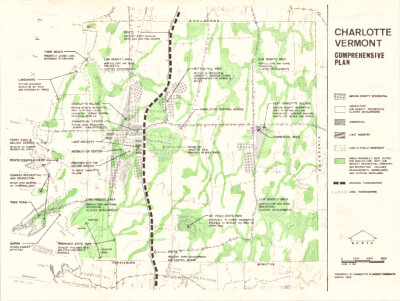Planning commission chair predicts amendments won’t make dramatic change in town
Supporters of proposed land-use regulation amendments appear to have done a good job of making the case for those changes.
Since two articles, intending to spur more and denser development in East Charlotte Village, were defeated about a year and half ago, many comments have been made saying the planning commission should have done a better job of communicating the intended purpose and effect of those proposed articles.
One of those most insistent that the messaging should have been clearer has been former long-time chair of the planning commission Peter Joslin, who has not been shy about admitting they should have done a better job of informing residents.
This time the commission must have done better.
In a change from Town Meeting Day voting in March 2021, on Tuesday voters approved all six articles amending land-use regulations by sizeable margins.
Even the most controversial of these land-use amendments passed easily. Article 5, an amendment increasing the allowed size of an accessory dwelling units, passed with almost 65 percent of the votes cast on this issue.
This change will mean the allowed size of an accessory dwelling unit will increase from 1,000 square feet or 30 percent of the square footage of the primary residence, whichever is larger, to 1,500 square feet or 30 percent of the square footage of the primary residence. This means every homeowner can build a second dwelling of up to 1,500 square feet no matter how small their primary dwelling — as long as they have sufficient water, sewage and property.
Planning commission chair Charlie Pughe doesn’t think these amendments will have a dramatic impact on Charlotte.
“The increase in the size of the accessory dwelling unit will allow some people to build a little bit bigger accessory dwelling unit than they might have done otherwise, but I don’t think it’s going to materially change the number of people who are going to build an accessory dwelling unit,” Pughe said.
Most of the rest of the amendments are clarifications of the land-use regulations, he said.
There are not that many accessory dwelling units in Charlotte now, Pughe said. It’s tricky to come up with an exact number, but he thinks there are probably around 50. He doesn’t see that number going up significantly.
The change will give homeowners more flexibility of ways to utilize their property. Because of the pandemic, more people are working from home and need more work space. Also, the accessory dwelling unit amendment increases opportunities for people to “age in place” and live out their lives at home.
There is a trend towards more multi-generational living. He said this amendment makes it easier for homeowners to build a second home where they or their adult children can live together.
During the planning commission’s work on developing these six amendments, it had planned to start working on more amendments to the land-use regulations for residents to vote on at Town Meeting Day this March, but towards the end of that process, the commission realized statutory requirements didn’t allow enough time to have another round of proposed changes ready by then.
Pughe said amendments might be ready for approval next November, but there isn’t an election so it would require a special election, which means it might be Town Meeting Day in 2024 before voters will consider more adjustments to the town’s land-use regulations.
During the next year, he predicts the planning commission will be digging into the issue of cannabis growing operations in town and focusing on ways to increase building density in Charlotte’s villages. In fact, cannabis regulation is on the agenda for this Thursday’s (Nov. 17) planning commission meeting.
More than 1,000 people voted on the proposed amendments on a separate ballot. The special ballot for land-use regulation amendments was not automatically mailed to town voters, so people who voted early had to request the ballot, one of three separate ballots for this election.
Many early voters got this special ballot when they went to town hall to drop off ballots. It was a confusing process, so Pughe said, having more than 1,000 people vote on the amendments was a fabulous turnout. “I think it’s great we had that level of turnout and community engagement.”
More than 1,000 town residents also weighed in on the ballot concerning whether the Champlain Solid Waste District should build a new materials recovery facility. It passed countywide with Charlotte supporting the measure 999-182.
Pughe said town clerk Mary Mead and her team did a really good job in helping voters realize there were two other ballots at the town hall that weren’t mailed to registered voters like the state ballot had been.
The good performance and clear communication by the clerk’s office and volunteers is also reflected in that there were no defective ballots cast which couldn’t be counted in this election.
Related Stories
Popular Stories
If you enjoy The Charlotte News, please consider making a donation. Your gift will help us produce more stories like this. The majority of our budget comes from charitable contributions. Your gift helps sustain The Charlotte News, keeping it a free service for everyone in town. Thank you.
Andrew Zehner, Board Chair






